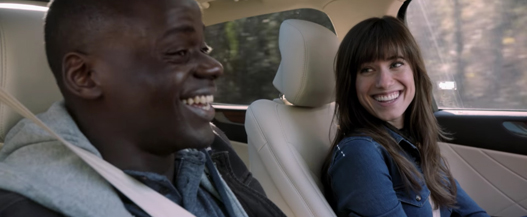Movie Review: Get Out
By Ben Gruchow
February 27, 2017
We know that this can’t really be the total cause of the movie’s events; we’ve seen the opening sequence, where a young black man walking down a suburban street at night is attacked and abducted (the chain of perspectives at work in this opening, starting with a pivotal event happening out of focus in the background while we’re focused on the man’s face, and continuing with a positively nerve-wracking tracking and rotating shot, occur in context of similar events that have taken place in real life, giving the whole thing added effect). Still, though, Chris is taken in and welcomed by Rose’s family, with just enough of a hint of, “Is that really how he/she said it…?” to give us more than a few moments of pause about how accurate to reality what we’re seeing really is.
The answer is, of course, "damned accurate”; the uncomfortable humor that the movie derives from its white population awkwardly trying to convince Chris that they’re on the same side (a tossed-off line referencing President Obama is funny and poignant and tense for reasons that I don’t even think the filmmakers intended, given who sits in the Oval Office now) sustains the first half of the movie, but starts to go out of the situation with a set piece involving the entire family and an unexpected guest and a camera flash that goes off at exactly the wrong time, and it dissipates entirely with a sequence following shortly after, involving a storage container in a bedroom closet. Omnipresent throughout all of this is the feeling that we get (courtesy of Chris and Kaluuya’s performance) of being on display for others to either solicit, touch, or judge. It’s jarring how well the movie succeeds at communicating the discomfort associated with being entirely too visible, with - negatively or positively - being a thing to claim solidarity with or superiority over more than a human being, and how much this drives the conflict of the film without announcing itself.
Of course there’s something wrong at Rose’s parents’ house, and of course Dean and Missy are a part of it. I feel no shame about coming out with that revelation in this review; the only alternative would be some variation on the It’s-All-In-Your-Head plot resolution, and that would’ve been a disqualifying choice in the context of this story. The movie wastes impressively little time on this, outside of a tour of the house and grounds that Dean gives Chris (and even this is more necessary than not; it uncovers geography we’ll need to understand later). There are no forced bonding episodes, no subplots. There is the introduction of the hired help, Georgina and Walter - both African-American, both possessed of oddly formal and precise behavior toward everyone. There are a few words about Missy’s skill with hypnosis, and about the upcoming family gathering.
Then there is that evening: Chris sneaks out for a cigarette, runs into Missy on his way back in, and is given a not-entirely-voluntary demonstration of exactly how effective her hypnosis routine is. This is the moment that was shown in the trailers, with Keener quietly insisting that Chris sink through the chair; the way the moment is conveyed, and what leads up to it, are where the movie lets us know that it is a different animal than we expected. Some moments of levity pop up after this - the movie’s big revelation, communicated via video, even gets some dark amusement from its particular production values and aesthetic - and it doesn’t truly take its turn into outright horror until the final 25 minutes, we have a good idea by this point where we are headed. There is perhaps no greater signpost to this than the one big scene we get with Georgina, played by Betty Gabriel, and more specifically on one key moment where her mask of composure breaks for just a second. It’s a couple of seconds, but the entire concept behind the movie’s antagonist (and the way the ending plays out, to a degree) hinges on the layer of remove peeling back to reveal something far more unsettling underneath.
The movie is directed by Jordan Peele, of Key & Peele; what he shows here is a willingness to apply the same spirit of suspicious incredulity into a scenario that is simultaneously outlandish and, well, getting more possible by the day. The skill with which this is done is what gives Get Out its impact as a thriller; the timing of its production and release, and the general tone of, “Why wouldn’t this end up happening, at this point?” are what give it teeth, up to and including a final run of events as disaffectedly brutal as anything since…well, since the John Wick sequel a couple of weeks ago, I guess, but in a far different context here and with markedly more impact. It takes nerve to produce a genre film this explicitly involved in race and racial tension, and we are gratified to learn that there’s not just nerve at work. By that final scene, we have wholly bought into the character and conflict.
4.5 out of 5
Continued:
1
2
|
|
|
|




